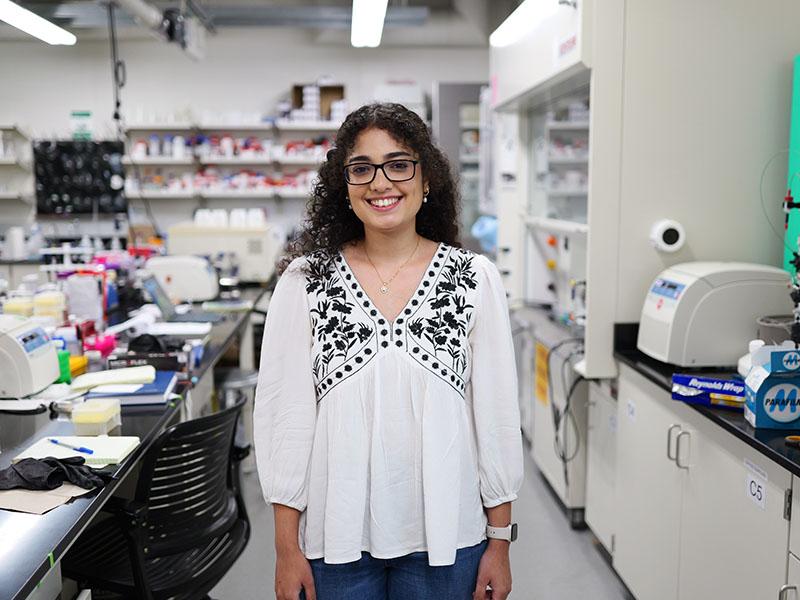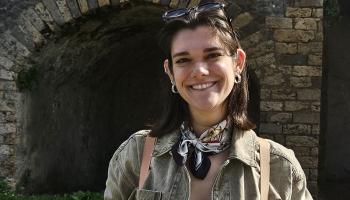Grad Student Rachita Dash Aims to Crack the Code of Drug Delivery

For Rachita Dash, a fifth-year chemistry Ph.D. at the University of Virginia, an early passion for biology sparked a journey that led her to an interest in the study of chemical biology and drug development research that could change how life-saving medicines are designed and tested.
“I came to a chemistry program from a more biology-focused training,” said Dash, who is pursuing a doctoral degree in UVA’s Graduate School of Arts & Sciences. Attracted by the wealth of opportunities to pursue interdisciplinary research, she found a home in UVA’s Pires Laboratory where biology and chemistry merge in the service of human health.
Dash’s research group focuses on one of the most critical and underappreciated aspects of drug development: the penetration of molecules into cells to reach their targets. Working in the lab of associate professor of chemistry Marcos Pires, she studies how structural features of molecules affect their ability to cross complex cell walls — a fundamental hurdle in the treatment of diseases like tuberculosis.
“In bacterial cells, for example, one of the major defenses that they have is their cell wall,” Dash explained. “They are extremely elaborate; that’s especially so of the one that causes tuberculosis. It’s a very large and unique cell wall, which is one of the reasons why there aren’t a lot of antibiotics that are effective against tuberculosis.”
Dash uses bioluminescence to track molecule accumulation inside E. coli cells. She also studies cyclic peptides — amino acids used in drug development — to understand how variations in their molecular structure affect their ability to pass stubborn bacterial-wall defenses.
“More effort needs to be put into learning what is driving molecules through cell walls; whereas, a lot of effort has been put into how those molecules target what’s inside,” she said. “It’s an area not coming to the forefront.”
Her work in the Pires Lab, which has already produced publications that are either published or under review at leading journals in her field, aims to help scientists improve promising drug candidates before they fail in pre-clinical testing — failures that can stem from poor cellular penetration.
“Measuring peptide accumulation in bacteria is crucial for antibiotic discovery,” Pires said. “Rachita has developed platforms to accurately measure this in difficult pathogens, aiding in optimizing drug candidates."
Dash’s goal is to better understand what her research group calls “the molecular grammar” that governs the penetration of molecules into cells — knowledge that can make the development of new pharmaceuticals faster and much more effective.
“I think this should become part of the drug exploration process,” Dash said, “Not only making sure drugs are effective against their targets but also making sure that those drugs are effective at reaching those targets inside living cells.”
Dash’s efforts recently earned her an opportunity to present her findings at the European and International Peptide Symposium in Florence, Italy. It has also earned her some of UVA’s most prestigious honors, including the Jefferson Dissertation Year Fellowship from the Jefferson Scholars Foundation, the Littleton Glover Endowed Graduate Fellowship from Arts & Sciences, and the Department of Chemistry’s Hunt Fellowship.
“Rachita’s research exhibits the cross-disciplinary innovation that defines our vibrant research community,” said Christa Acampora, Buckner W. Clay Professor of Philosophy and dean of the College and Graduate School of Arts & Sciences. “Her contributions are truly impressive and push the discovery to address the world’s most pressing challenges.”
According to Linda Columbus, UVA’s Commonwealth Professor of Chemistry, professor of molecular physiology and biological physics and chair of Arts & Sciences’ Department of Chemistry, Dash’s research represents a crucial frontier in the fight against antibiotic resistance.
“Her innovative work investigating how antibiotics accumulate within bacterial cells addresses a significant challenge in infectious disease treatment — understanding why some antibiotics succeed where others fail. Working under the guidance of Dr. Marcos Pires, whose lab has pioneered creative chemical approaches to study bacterial processes, Rachita is uncovering fundamental principles that could guide the development of more effective therapeutics.”
As she completes her final year at UVA, Dash is weighing her next steps. She hopes to continue working in drug development, wherever that may lead her.
“I have a lot of passion for what I do. I’ll always be curious, and I’m always looking for new ideas to explore,” she said. “If you have a love for science, I think that naturally comes with it.”
Outside the lab, Dash enjoys experimenting with Indian cooking — without the precision her research demands.
“I never like to measure anything,” she said. “I do that all day in the lab.”







